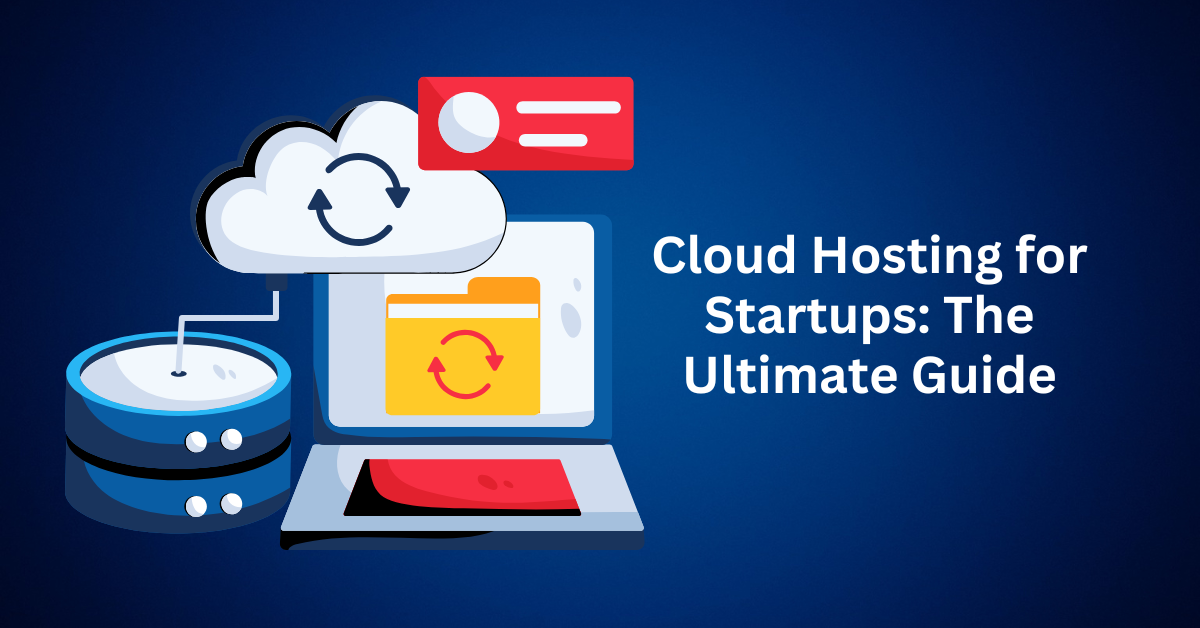Launching a startup is an exciting journey, but navigating the technical infrastructure can quickly become overwhelming. One of the most critical early decisions you’ll face is choosing the right hosting solution, a choice that can significantly influence your startup’s performance, growth, and long-term scalability. This is where cloud hosting steps in. It’s a powerful, flexible, and startup-friendly option designed to support your business every step of the way from MVP to market domination.
In today’s fast-paced digital landscape, more and more founders are moving away from outdated hosting models and embracing the cloud for its speed, security, and seamless scalability. Whether you’re building a SaaS platform, launching an eCommerce site, or validating a new product idea, cloud hosting delivers the agility and performance you need to grow quickly, without the usual tech headaches.
In this comprehensive guide, you’ll learn:
- What cloud hosting is and how it empowers startups
- The biggest advantages of cloud hosting compared to traditional hosting
- The top cloud hosting providers tailored for startups
- A step-by-step roadmap to move your startup from launch to scale using cloud infrastructure
Let’s dive in and explore why cloud hosting could be the smartest investment you make in your startup’s future.

Table of Contents
ToggleWhat is Cloud Hosting? And Why Should Startups Care?
At its core, cloud hosting is a type of web hosting that leverages a network of virtual servers, rather than relying on a single physical machine, to keep your website or app online and running smoothly.
Unlike shared or VPS hosting, which limits you to fixed resources on one server, cloud hosting connects you to a flexible pool of computing power. Think of it as having an entire data center at your fingertips, with the ability to scale resources up or down based on real-time demand.
Here’s how different hosting models stack up:
- Shared Hosting: Low cost, low performance. Your site shares resources with others. Good for hobby blogs, not for startups.
- VPS Hosting: A step up, offering dedicated slices of a server, but still limited in scalability.
- Cloud Hosting: Highly scalable, ultra-reliable, and built for dynamic workloads. Perfect for startups ready to grow without limits.
For startups, cloud hosting means:
- Faster launch times for digital products and websites
- The ability to handle traffic surges without crashing
- Cost-efficient scaling. Only pay for what you use
- Minimal downtime and built-in disaster recovery
- No need for in-house server management or hardware investment
From day one, cloud hosting aligns with the lean, agile mindset of modern founders.
7 Powerful Benefits of Cloud Hosting for Startups
When you’re building a startup from scratch, every second, every decision, and every dollar can shape your success. That’s why more founders are turning to cloud hosting. A modern solution that grows with your business, reduces overhead, and helps you scale faster than ever.
Whether you’re launching your MVP, running a small team remotely, or preparing for your next growth phase, cloud hosting provides the performance, flexibility, and security startups need to thrive in a competitive digital landscape.
Here are seven essential reasons why cloud hosting is a smart choice for startup founders.
1. Lower Operational Costs for Cloud Hosting with Pay-As-You-Grow Pricing
Startups often operate with limited budgets; therefore, cloud hosting is designed to accommodate that reality. Rather than investing in costly hardware or committing to rigid server packages, you can instead leverage pay-as-you-go pricing models that align with your actual usage.
As a result, this approach offers several key benefits. First, you avoid upfront capital expenses on servers or IT infrastructure. Next, you enjoy flexible billing that scales with your needs. Additionally, many leading cloud providers offer free tiers, startup credits, or affordable plans tailored for new businesses. Ultimately, this cost-effective structure allows you to stay agile, experiment freely, and grow sustainably, all without overextending your finances.
2. Rapid Launches and Faster Time-to-Market with Cloud Hosting
In the fast-paced startup world, speed is everything, and cloud hosting gives you the ability to launch websites, applications, or digital products in minutes instead of weeks.
The cloud accelerates development through instant provisioning of virtual machines and environments, one-click deployment for popular tech stacks like WordPress and WooCommerce, and built-in CI/CD tools that streamline code releases. Whether you’re building your MVP or rolling out updates, cloud hosting eliminates time-consuming setup tasks, allowing you to focus on what matters most: delivering real value to your users.
3. Seamless and Effortless Scalability with Cloud Hosting
Startups often grow in unpredictable ways. Sometimes, gradually, and other times, experiencing explosive growth overnight. Fortunately, cloud hosting is specifically designed to manage this kind of uncertainty. By offering on-demand scalability, it ensures your infrastructure can seamlessly adapt to sudden traffic surges or evolving expansion needs. As a result, your business stays responsive and resilient, no matter how fast things change.
With cloud scalability, you benefit from dynamic resource allocation for memory, storage, and processing power. In addition, features like auto-scaling and load balancing work together to maintain high availability during peak usage. Depending on your application’s architecture, you can also take advantage of either horizontal or vertical scaling options to adapt more efficiently. As a result, your system delivers fast, reliable performance, no matter how quickly your user base grows.
4. Built for Remote Teams and Global Collaboration with Cloud Hosting
In today’s remote-first world, cloud hosting not only supports global operations but also makes distributed collaboration seamless and secure. With it, your team can access essential tools, codebases, and dashboards from anywhere, thereby enabling productivity without borders.
Among the key collaboration features are unified cloud dashboards with customizable team access and permissions. In addition, real-time updates through shared development environments keep everyone on the same page. Furthermore, seamless integration with version control systems like Git, Bitbucket, and GitHub streamlines teamwork and project tracking. Altogether, this setup is ideal for startups working with developers, designers, and marketers across different time zones, ensuring everyone stays connected and aligned.
5. Enterprise-Level Security from Day One with Cloud Hosting
Startups may not have the resources for a dedicated cybersecurity team; however, that doesn’t mean data protection can be overlooked. Fortunately, cloud hosting platforms come equipped with robust, built-in security features designed to safeguard your business from day one.
Through cloud security, you gain access to firewalls, malware detection, and intrusion prevention systems that actively defend against threats. Additionally, automated backups with versioning and restore points ensure your data remains intact and recoverable. Meanwhile, encrypted connections, VPN support, and role-based access controls help keep sensitive information secure. Whether you’re protecting customer data or securing internal systems, cloud hosting provides the peace of mind you need to focus on growing your business.
6. High Availability, Business Continuity, and Disaster Recovery with Cloud Hosting
For startups, downtime can be costly, both financially and reputationally. That’s why cloud infrastructure is designed with redundancy and reliability at its core, ensuring your services remain available even when unexpected issues arise.
Key reliability features include geo-distributed data centers that reduce single points of failure, disaster recovery protocols that enable quick restoration, and always-on architecture supported by uptime SLAs as high as 99.99%. As a result, even in the face of technical glitches or regional disruptions, your startup can continue operating smoothly and delivering value with minimal interruption.
7. Access to the Latest Technologies and Innovation with Cloud Hosting
One of the most exciting advantages of cloud hosting is the access it gives startups to cutting-edge technologies, without the need to invest in expensive, in-house infrastructure.
With innovation at your fingertips, you can tap into powerful tools like AI, machine learning, and big data analytics. You also gain access to modern development solutions such as serverless computing and container orchestration with platforms like Docker and Kubernetes. Additionally, managed database services, API gateways, and event-driven architectures make it easier to build and scale complex systems efficiently.
This level of access empowers your startup to innovate, optimize, and compete with much larger companies while operating on a fraction of the budget.
The 8 Best Cloud Hosting Providers for Startups: Performance, Scalability & Value Compared
When launching a startup, choosing the right cloud hosting provider isn’t just about securing server space. Instead, it’s about building on a foundation that fuels long-term growth. In today’s fast-paced digital environment, startups require more than basic functionality; they demand agile infrastructure, cost-efficiency, and the flexibility to scale as needed. Therefore, your cloud host should deliver more than just reliable uptime. It must also support innovation, enable rapid deployment, and adapt to your evolving business needs.
With that in mind, to help you make a well-informed decision, we’ve compiled a detailed comparison of eight top cloud hosting platforms. These providers offer startup-friendly features, scalable infrastructure, and competitive pricing. Whether you’re looking for AI-powered capabilities or budget-friendly performance, this guide walks you through the pros and cons of each option, so you can confidently choose the solution that aligns best with your goals.
1. Bluehost: Best for WordPress-Powered Startups
Bluehost strikes a balance between user-friendliness and high performance, making it an ideal choice for early-stage startups. In particular, its cloud hosting solutions are designed for fast deployment and reliable uptime, which helps teams launch quickly and scale with confidence. Moreover, with an average server response time of 200–300 ms and uptime ranging from 99.9% to 99.99%, Bluehost delivers the speed and stability that growing businesses need.

Key features include SSD-powered infrastructure for faster data access, a free SSL certificate and CDN for secure, high-speed delivery, and 24/7 expert support to assist whenever needed. Seamless integration with WordPress and other CMS platforms further streamlines setup and management, making Bluehost a favorite among startups building content-driven or eCommerce sites.
Pros:
- Easy-to-use dashboard
- Optimized for WordPress and eCommerce
- Quick setup with scalable plans
Cons:
- Limited developer tools for advanced customization
- High renewal pricing compared to entry-level rates
Best For: Startups launching WordPress-based websites that prioritize ease of use and support.
2. HostGator: Best for Budget-Friendly Cloud Hosting
If you’re bootstrapping or launching an MVP, then HostGator offers a budget-friendly entry point that doesn’t sacrifice essential features or reliability. With a solid 99.98% uptime and automatic scaling capabilities, it’s an excellent choice for lean teams aiming to grow efficiently.
Notable features include one-click migrations for hassle-free setup, an intuitive cPanel interface that simplifies day-to-day management, and 24/7 customer support to keep your operations running smoothly. Combined, these elements ensure that HostGator delivers the performance, reliability, and flexibility startups require, all while staying within the constraints of an early-stage budget.
Pros:
- Affordable starter plans
- Scalable cloud options
- Simple user experience
Cons:
- Dated dashboard UI
- Not ideal for complex infrastructure or apps
Best For: Budget-conscious startups building prototypes or early products.
3. Amazon Web Services (AWS): Best for Startups Needing Enterprise-Level Power
AWS is the undisputed leader in cloud infrastructure, and its startup programs provide immense value for early-stage companies. In particular, with access to over $1 billion in annual startup credits—including a recently added $230 million AI credit pool—AWS equips startups with the tools they need to build powerful, scalable solutions right from day one.
Whether you’re developing AI-driven platforms, advanced analytics tools, or applications built to scale globally, AWS provides the infrastructure and services to support your vision. Key features include Elastic Compute Cloud (EC2) for flexible compute resources, advanced AI/ML services like SageMaker, and a vast global server network that ensures speed, reliability, and reach.
Pros:
- Unmatched scalability and performance
- Extensive developer tools
- Credits and support for startups
Cons:
- Steep learning curve
- Pricing can become complex without monitoring
Best For: Tech startups focused on AI, machine learning, big data, or global expansion.
4. Hostinger: Best for Affordable Performance & Speed
Hostinger is a standout choice for startups and new businesses seeking fast, reliable hosting without breaking the bank. Thanks to its affordability and performance, Hostinger delivers impressive results, powered by LiteSpeed servers and a global network of data centers, making it easy to serve users quickly from virtually anywhere.
With a 99.96%+ uptime guarantee, you can trust your site to stay consistently online. Moreover, Hostinger features a user-friendly custom dashboard for simplified site management, along with built-in caching to ensure fast load times. Overall, it’s a smart, cost-effective option for lean teams that prioritize speed, stability, and growth.
Pros:
- Very affordable plans
- Global coverage
- Modern interface
Cons:
- Support response time can vary
- Not suited for high-complexity apps
Best For: Startups that need speed and stability without heavy infrastructure costs.
5. Microsoft Azure: Best for Compliance-Driven and Hybrid Cloud Startups
Microsoft Azure brings enterprise-grade cloud capabilities to startups, making it a strong choice for teams seeking robust infrastructure, especially in regulated industries. With $200 in startup credits and a comprehensive suite of services, Azure supports everything from AI development to hybrid cloud deployments.
Startups benefit from features like virtual networks, advanced AI tools, and seamless integration with Microsoft’s ecosystem, including tools like Office 365 and Teams. Azure also offers strong identity management and compliance support, making it ideal for businesses that prioritize security, governance, and long-term scalability.
Pros:
- Enterprise-grade security
- Disaster recovery support
- Ideal for hybrid environments
Cons:
- The interface can feel overwhelming
- Billing complexity
Best For: Startups in fintech, health tech, or industries requiring strict compliance and robust cloud tools.
6. Google Cloud Platform (GCP): Best for Data-Driven and AI-Focused Startups
Google Cloud is a top choice for data-driven startups, as it offers powerful tools and infrastructure specifically designed for high-performance analytics and AI development. With $300 in free credits and access to industry-leading technologies like TensorFlow and BigQuery, Google Cloud stands out as an ideal platform for startups focused on machine learning, big data, and predictive analytics.
Key features include fast, customizable virtual machines, a global CDN with edge networks for low-latency performance, and predictive autoscaling that dynamically adjusts to real-time traffic. Therefore, for startups building with data at their core, Google Cloud offers the speed, intelligence, and flexibility needed to scale both smart and fast.
Pros:
- Advanced AI and machine learning integrations
- High-performance compute power
- Scalable with a strong ecosystem
Cons:
- Requires technical setup knowledge
- Intricate pricing models
Best For: Startups building SaaS platforms, data analytics tools, or AI-driven products.
7. SiteGround: Best for High-Speed, Secure WordPress Hosting
SiteGround is a top-tier hosting option for startups that prioritize performance and security. With an impressive 99.99% uptime and WordPress page load speeds under 0.5 seconds, it delivers the speed and reliability that fast-growing businesses demand.
In addition, startups benefit from AI-powered security tools that proactively block threats, as well as fully managed services that simplify site maintenance. Notable features include an advanced AI firewall, free CDN, daily backups for added peace of mind, and WordPress staging tools that make testing updates effortless. Ultimately, for startups where performance, protection, and ease of use are critical, SiteGround stands out as a smart, dependable choice.
Pros:
- Excellent performance and reliability
- Built-in security and caching
- Great for WordPress-centric startups
Cons:
- Premium pricing
- Less flexible for custom stack deployments
Best For: Startups focused on content, eCommerce, or SEO-driven growth using WordPress.
8. DreamHost: Best for Privacy-Conscious and Transparent Hosting
DreamHost is a great option for startups that value simplicity, transparency, and a strong commitment to privacy. Thanks to its no-nonsense approach featuring unlimited bandwidth and clear, upfront pricing, it’s especially appealing to bootstrapped teams seeking predictability without hidden fees.
Among its key features are a free domain with WHOIS privacy to protect your identity, unlimited traffic to support growth without penalties, and a generous 97-day money-back guarantee. All in all, for startups that prioritize straightforward hosting and strong privacy protections, DreamHost delivers a dependable, hassle-free experience.
Pros:
- Transparent and simple pricing
- Free site migrations
- Trustworthy support team
Cons:
- Basic dashboard UX
- Fewer enterprise-grade features
Best For: Startups launching MVPs, blogs, or lightweight applications with a focus on privacy.
How to Get Started with Bluehost Cloud Hosting for Your Startup
If you’re launching your first website or planning a smart migration from another host, Bluehost offers a powerful and startup-friendly cloud hosting solution designed to grow with your business. With built-in scalability, intuitive onboarding, and expert support, getting started is easier than you think.
Here’s a step-by-step checklist to help you hit the ground running with Bluehost cloud hosting:
1. Choose the Right Cloud Hosting Plan
Before anything else, evaluate your startup’s current needs as well as its future growth expectations. Choosing the right infrastructure early on can save you time, money, and technical headaches down the line.
Bluehost offers a range of cloud hosting plans tailored to different business stages from lean MVPs to high-traffic platforms, so it’s important to match your selection with your actual requirements. Consider key factors such as your estimated monthly visitors, the type of website you’re running (whether it’s an eCommerce store, SaaS product, blog, or portfolio), and your expected storage and bandwidth needs.
Ultimately, aim for a plan that fits your current budget but also offers the flexibility to scale alongside your business.
2. Register or Connect Your Domain
If you haven’t secured a domain yet, Bluehost makes it easy with built-in domain registration during signup. Already own a domain? You can quickly point it to your new Bluehost cloud server with simple DNS updates.
3. Set Up Your Hosting Environment
Bluehost’s step-by-step onboarding guide starts by walking you through everything from server configuration and control panel setup to email creation and plugin integrations. Moreover, the dashboard is beginner-friendly, which means you can easily navigate the process and get your digital foundation set up within minutes.
4. Prep Your Existing Site (If Migrating)
If you’re moving from an existing host, take a moment to clean house before the migration begins. Start by removing any outdated plugins, redundant files, or unused themes. By streamlining your site in advance, you’ll ensure a faster migration and enjoy smoother performance once your website goes live on Bluehost’s infrastructure.
5. Back Up Your Website Data
Before initiating a migration, always back up your existing data, files, databases, emails, and custom configurations. This is a crucial step to avoid any risk of data loss during the transition.
6. Launch or Migrate Your Website
Whether you’re building your site from scratch or migrating an existing one, Bluehost offers a free migration tool and dedicated support to make the process hassle-free. For new builds, their marketplace includes site builders, CMS integrations, and ready-to-use themes to get you launched fast.
7. Test Everything Before Going Live
Once your site is up and running, it’s essential to perform a thorough post-setup check to ensure everything functions smoothly. Start by testing your site’s speed and responsiveness across different devices and browsers to confirm a seamless user experience. Next, verify that all links and forms are working correctly to avoid any broken paths or missed inquiries.
You should also review your SSL security setup and firewall protections to ensure your site is secure from day one. Additionally, check that your email configurations and DNS settings are properly set up to prevent delivery issues or service disruptions.
Taking the time to confirm these details helps your website perform at its best from the very beginning, setting a solid, professional tone for your brand and building trust with visitors.

From MVP to Investor-Ready: How to Scale Your Startup Seamlessly with Cloud Hosting
Launching a startup is just the beginning. True success lies in your ability to grow, scale, and adapt quickly. That’s where choosing a startup-friendly cloud hosting solution like Bluehost can make all the difference. With a solid cloud foundation, you can launch faster, respond to real user demand, and scale without tech bottlenecks or ballooning costs.
Here’s a step-by-step roadmap to grow confidently from idea to investor-ready using Bluehost’s cloud infrastructure:
Step 1: Launch Your MVP with Speed and Simplicity
Forget long infrastructure setup cycles. With Bluehost’s managed cloud hosting, deploying your MVP becomes fast and hassle-free. Thanks to virtual machines and pre-configured environments, you can get up and running quickly, without getting bogged down by complex server configurations. Whether you’re building a SaaS platform, an eCommerce store, or a service-based website, Bluehost empowers you to launch your core product in record time. As a result, you can focus your energy on developing features that truly matter, instead of spending time managing backend systems.
Moreover, you’ll benefit from one-click installs for popular CMS platforms, which streamline your workflow even further. To top it off, Bluehost includes built-in SSL and CDN support, ensuring your MVP launches securely and loads fast, right from day one.
Step 2: Monitor Traffic, Performance & User Behaviour
After launching your MVP, tracking user interaction becomes essential, and this is exactly where Bluehost streamlines the process. With its integrated tools, along with seamless compatibility with third-party analytics platforms, you can gain instant access to the insights needed to make informed, data-driven decisions.
Moreover, these capabilities allow you to monitor real-time traffic and usage trends, measure website load times and uptime, and identify optimization opportunities based on actual user behaviour, ensuring your product evolves in step with user expectations. As a result, by understanding how your MVP performs in the real world, you’ll be far better equipped to refine both your product and infrastructure, ultimately setting the stage for long-term success.
Step 3: Scale Resources Automatically as Demand Grows
As your user base grows, your hosting needs to grow with it, without the hassle of manual migrations. Bluehost’s flexible cloud plans make this easy by allowing you to scale CPU, memory, and storage seamlessly as demand increases.
Whether you’re experiencing marketing spikes, seasonal traffic surges, or rolling out new product features, Bluehost adapts in real time to keep your site running smoothly. There’s no downtime, no disruptions. Just smart, effortless scaling based on actual usage.
Step 4: Control Costs with Smart Billing & Auto-Scaling
Startup budgets are tight, and the last thing you need is an unpredictable cloud bill. Bluehost helps you stay in control with transparent pricing and real-time usage alerts, so you always know where your money is going.
Key cost-saving features include auto-scaling with usage caps, real-time resource monitoring, and proactive alerts for high-traffic events or potential overages. As a result, you can strike the right balance between performance and budget, allowing you to stay lean without compromising on reliability.
Step 5: Be Demo Day-Ready with Reliable, Secure Hosting
When it’s time to impress investors or launch to a broader audience, the last thing you should worry about is your infrastructure. Fortunately, Bluehost takes that concern off your plate by delivering enterprise-level security, lightning-fast performance, and near-zero downtime, ensuring your product always projects a polished and professional image.
In addition, its redundant cloud architecture, built-in DDoS protection, and 99.9%+ uptime reliability mean you can scale with confidence and without disruption. Whether you’re pitching to venture capitalists or onboarding your 10,000th user, Bluehost ensures your cloud environment is as secure, scalable, and dependable as your vision demands.
Final Thoughts: Why Smart Cloud Hosting Is a Strategic Startup Advantage
Choosing cloud hosting for your startup isn’t just a technical checkbox. It’s a strategic decision that significantly influences how your business grows, scales, and competes in today’s fast-moving digital landscape. In fact, the right hosting partner does more than simply keep your site online. It also helps you launch faster with less friction, scale intelligently as traffic increases, stay secure and operational during challenges, and optimize costs without compromising performance.
For these reasons, more startups are turning to Bluehost’s cloud hosting. Built with flexibility, security, and startup-readiness in mind, Bluehost is equipped to support every stage of your entrepreneurial journey. Whether you’re launching a minimum viable product (MVP) or preparing for your first investor pitch, Bluehost delivers the reliability, performance, and tools you need to move forward with confidence.
Moreover, with features like virtual machines, scalable infrastructure, automated backups, disaster recovery, a global CDN, free SSL, and 24/7 technical support, Bluehost empowers you to focus on building your vision, not managing your server.
So, whether you’re just starting out or gearing up for your next big milestone, choose Bluehost as your cloud partner from day one. After all, it’s more than just hosting. It’s the foundation for long-term startup success.







